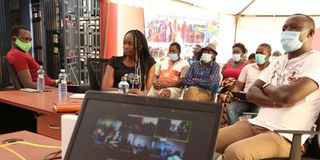Premium
Teens also have a stake in the nation’s fight against Covid-19

Champions of Peace Programme Director Elly Opondo (right) moderates a webinar session that involved youths spread across seven western region counties and riding on the theme “youth engagement for global action”, in Kisumu on August 8, 2020.
What you need to know:
- Kenya recorded the first case of Covid-19 in March and five months later, on August 9, there were 26,436 positive cases.
- An environment that stifles innovation is the reason why many young people look for opportunities to live and study abroad, where we take our talents and brains as our country remains underdeveloped.
People as young as 17 — myself included — are calling on the government to include them in the fight against Covid-19, and other social challenges rocking Kenya.
The youth have developed innovations that can reach their age mates who have been labelled as “super spreaders” due to their indiscipline.
We are better suited than adults to reach our peers and influence behaviour change.
Kenya recorded the first case of Covid-19 in March and five months later, on August 9, there were 26,436 positive cases.
Another 400 people have died according to Health ministry statistics.
Health Cabinet Secretary Mutahi Kagwe has constantly asked young people aged between 15 and 39 to exercise caution after it emerged that their indiscipline is aiding the spread of the virus.
Consequently, the virus has been killing their parents and those with other underlying health conditions such as diabetes, cancer and high blood pressure.
Flouting dawn-to-dusk curfew
Mr Kagwe may be justified in his allegations against the youth because there are young people who have been arrested in various parts of the country for flouting the dawn-to-dusk curfew that was put in place by the government to minimise the spread of the virus.
While the government has appealed to the youth to take their position against the coronavirus, the processes that young people have to follow to contribute to the fight against the pandemic are unclear.
In other instances, it is long, tedious and discouraging. This is disheartening because we make up more than half of Kenya’s population, but we are left out of the very things that affect us.
In March when Kenya recorded the first case, secondary schools were participating in the Kenya Science and Engineering Fair.
This is an event that is hardly ever attended by those at the helm of power and decision-makers in Kenya.
While the government encourages innovation in this fair, students like me are often left with the projects because we do not know where to take them after the events are over.
Stifles innovation
Apart from our schools, we do not know which offices to visit to advance these innovations.
We have never seen scouting agents for the innovations in the fairs. There are no emails, and even if they were there, we are not sure whether they would be replied to should we write to the government.
An environment that stifles innovation is the reason why many young people look for opportunities to live and study abroad, where we take our talents and brains as our country remains underdeveloped.
Our government should listen to and invest in us because solutions to Covid-19, and any other social problem, are better known by those who live in Kenya.
Are you aged 10-20 and would like to be Nation’s young reporter? Email your 400-600-word article to [email protected]




